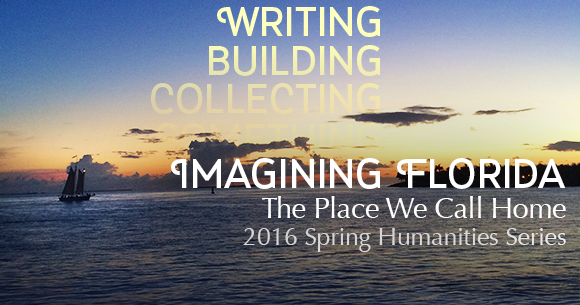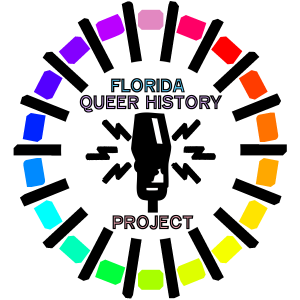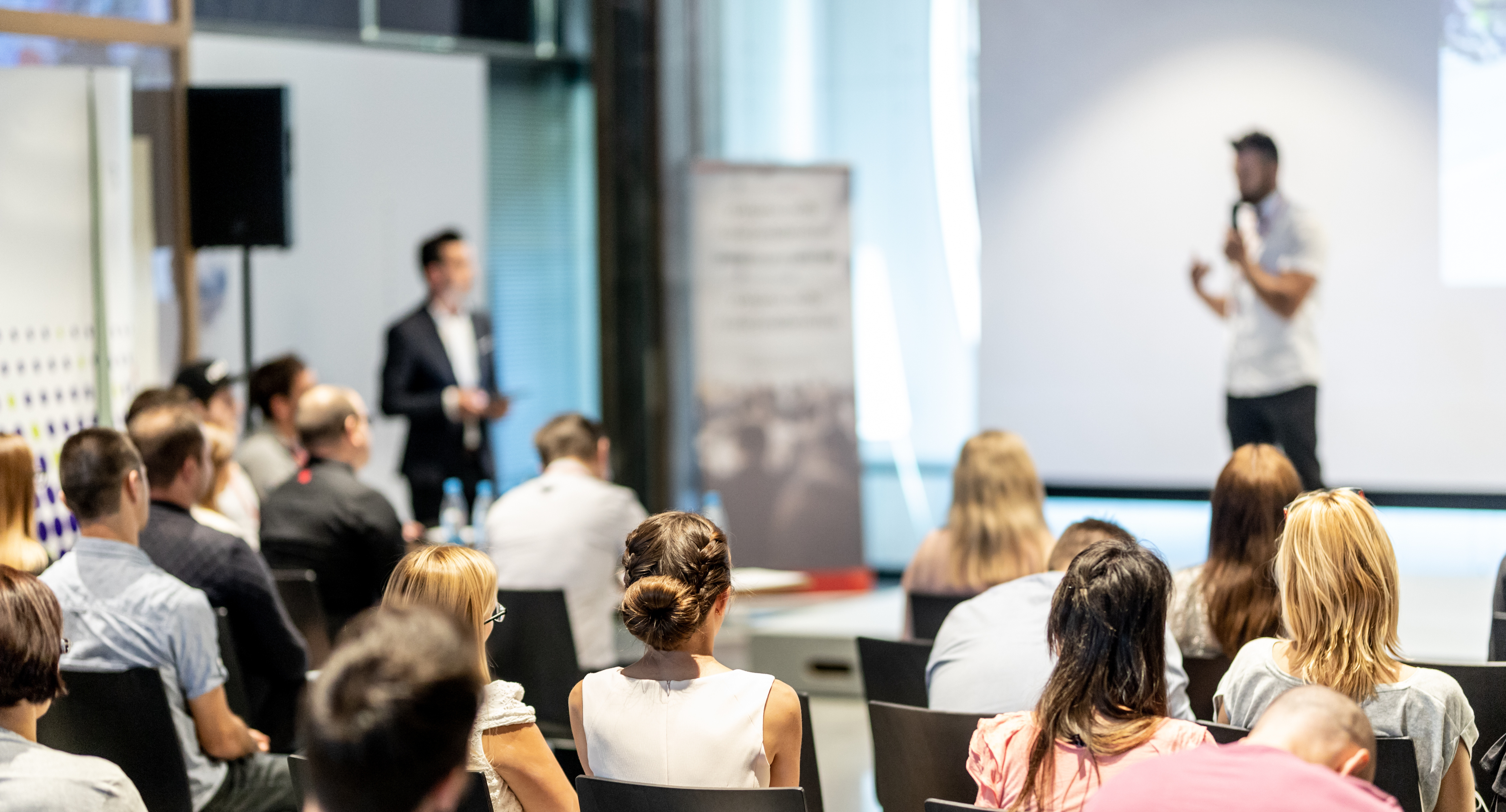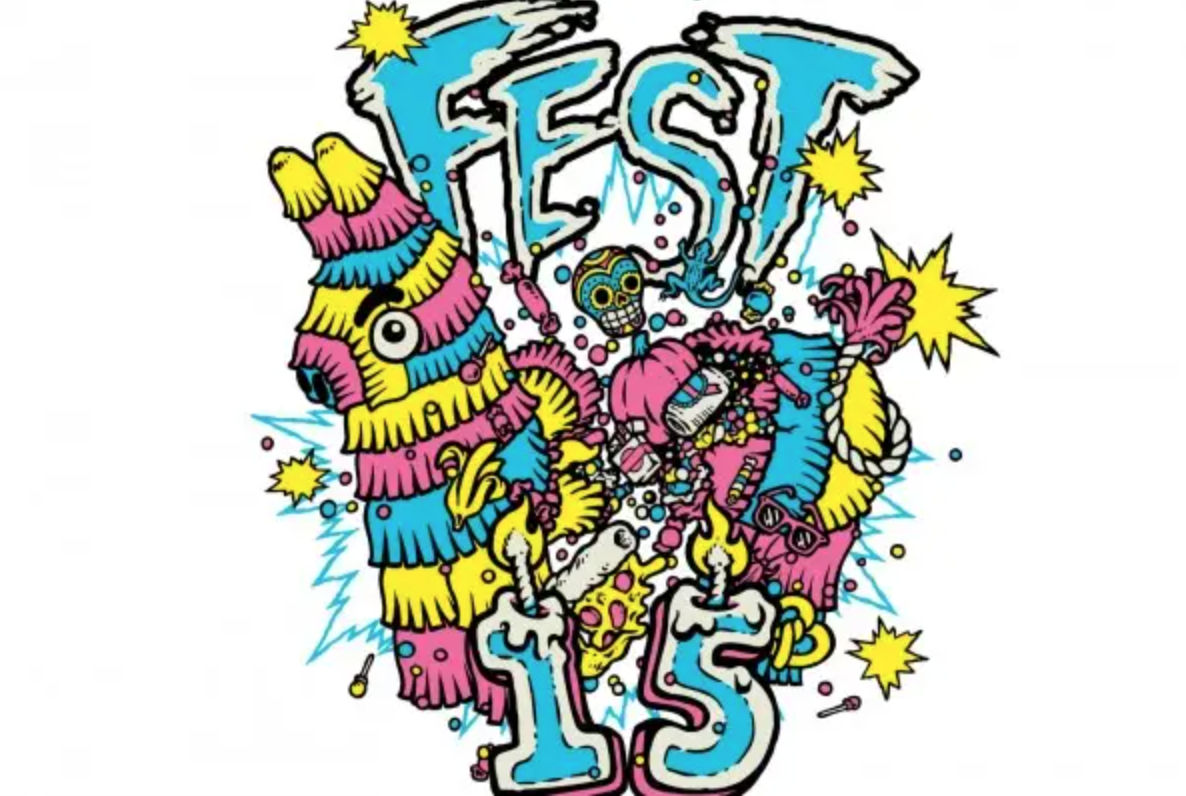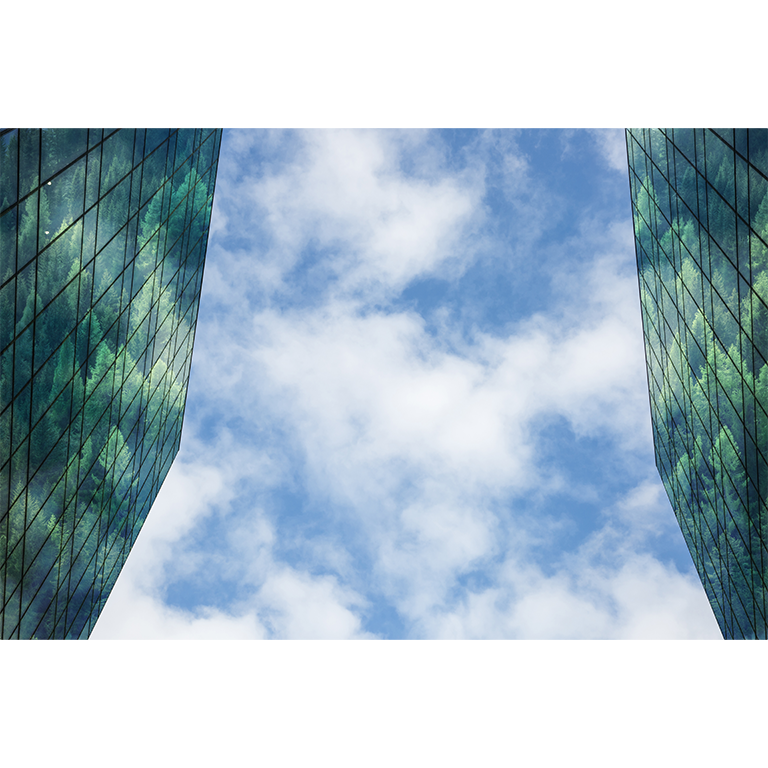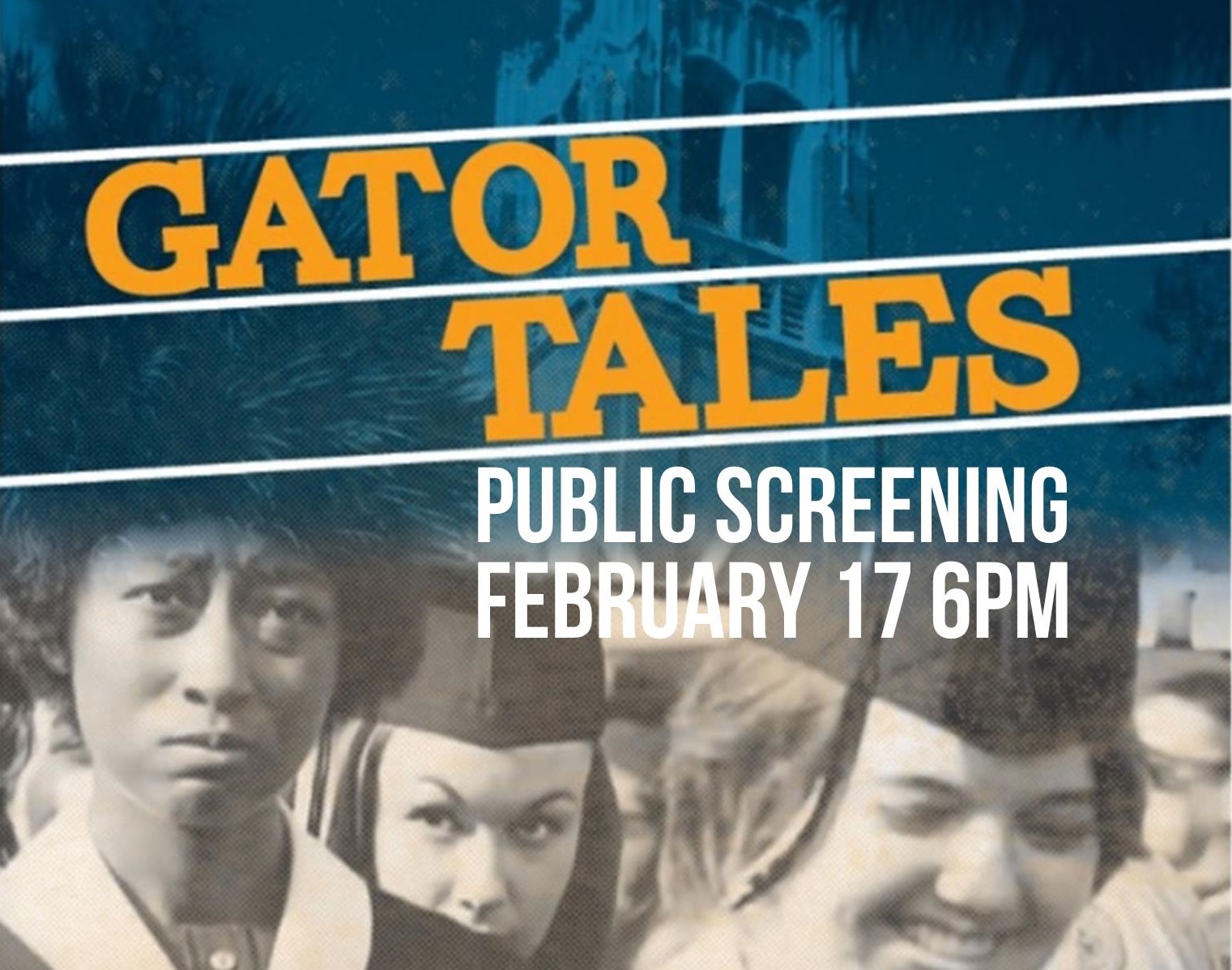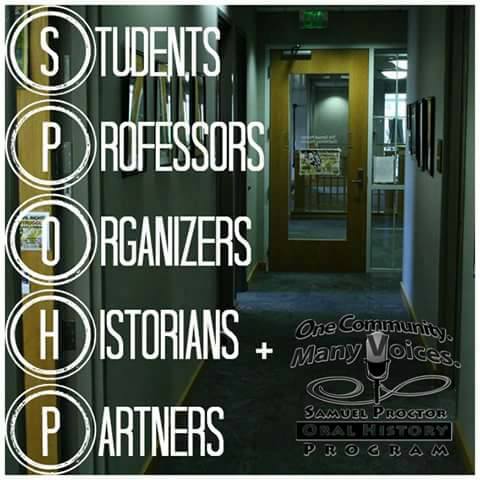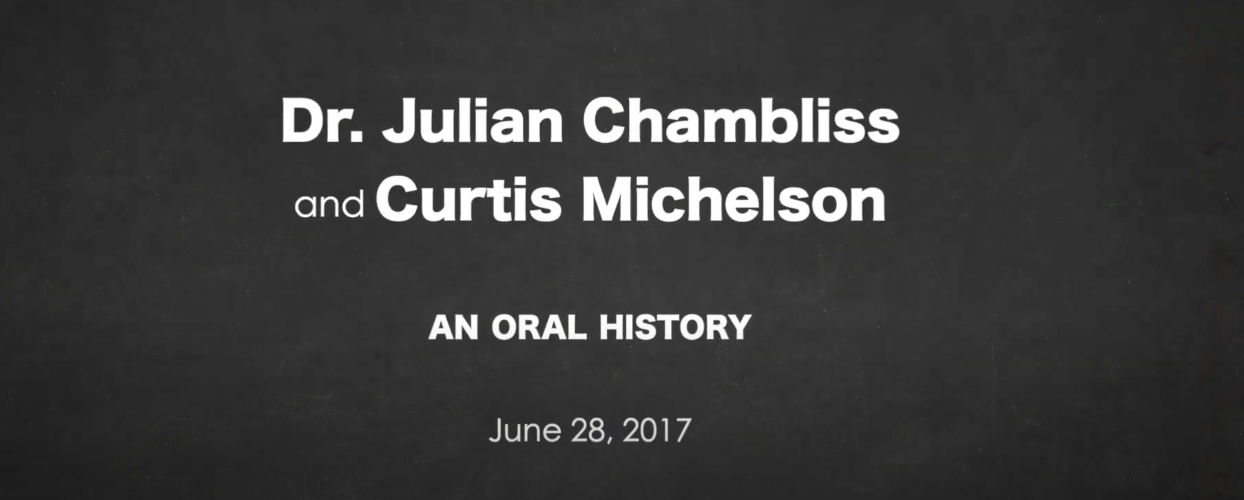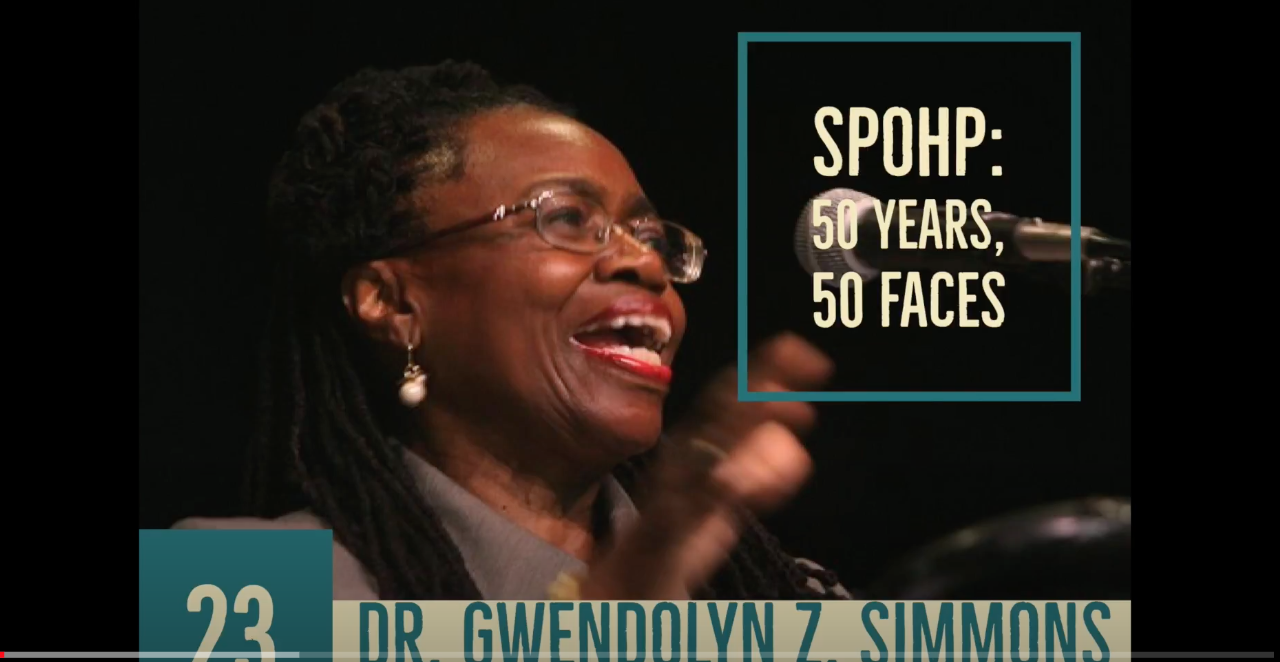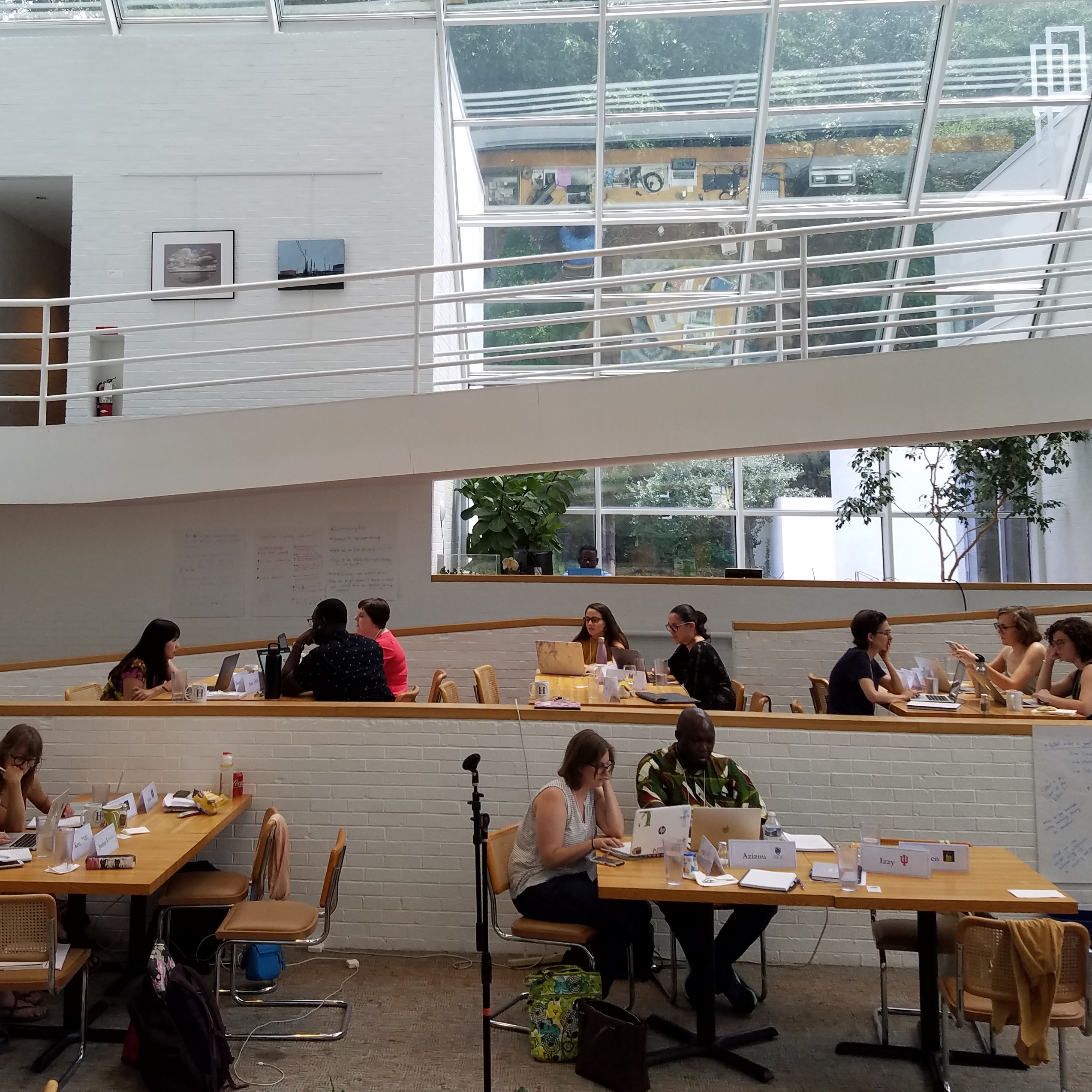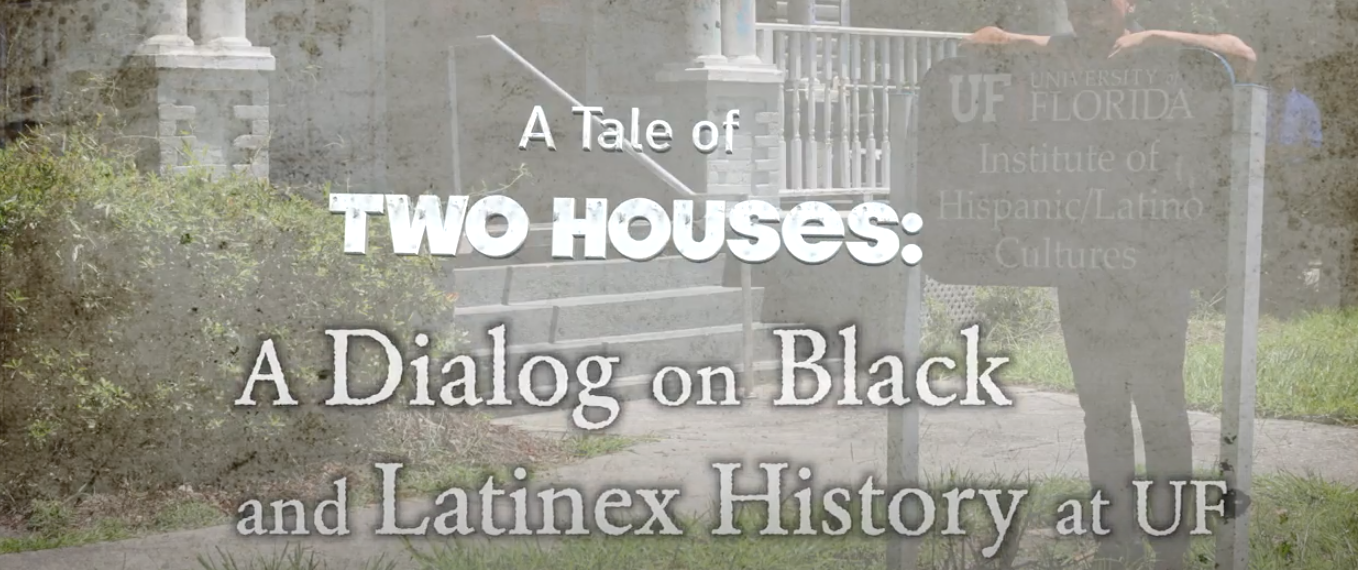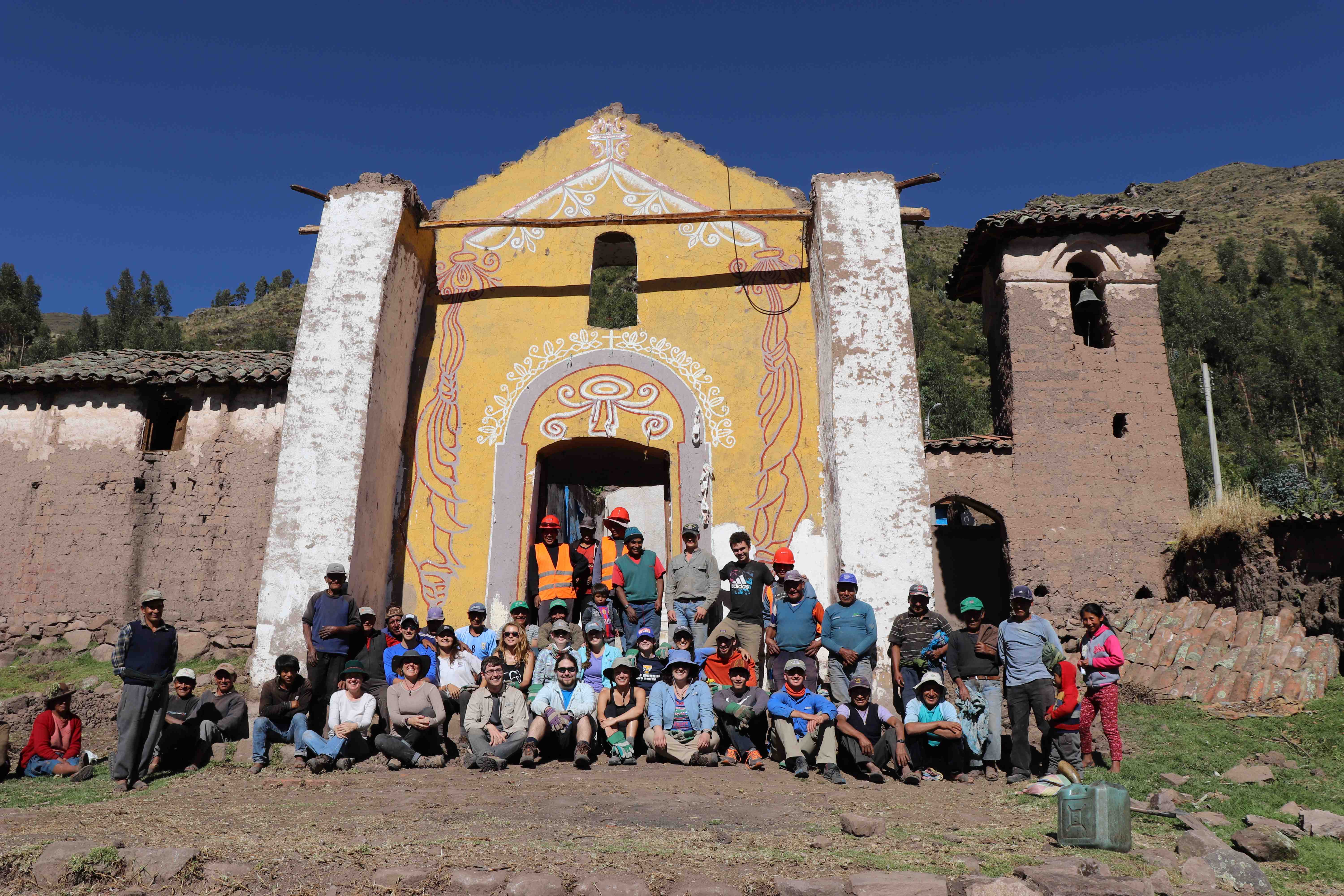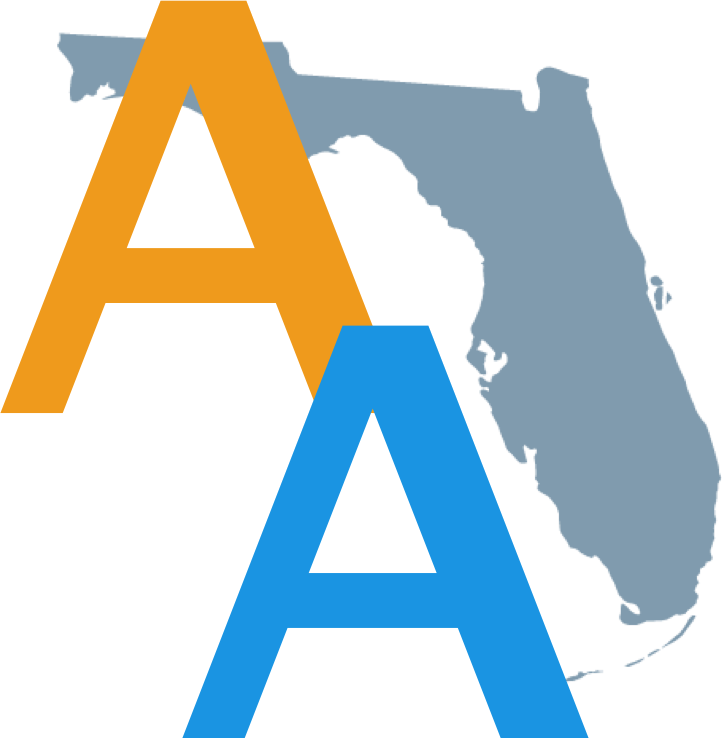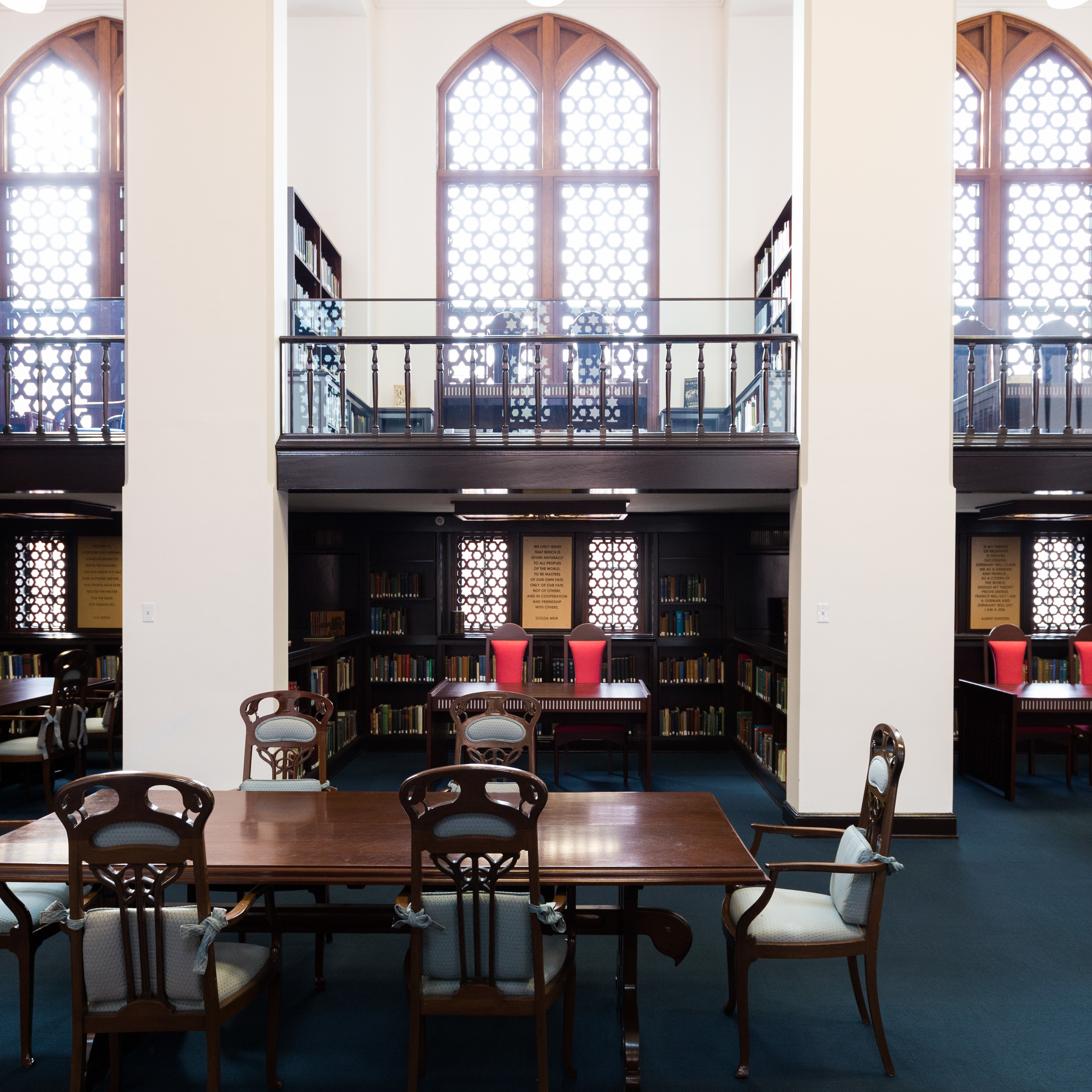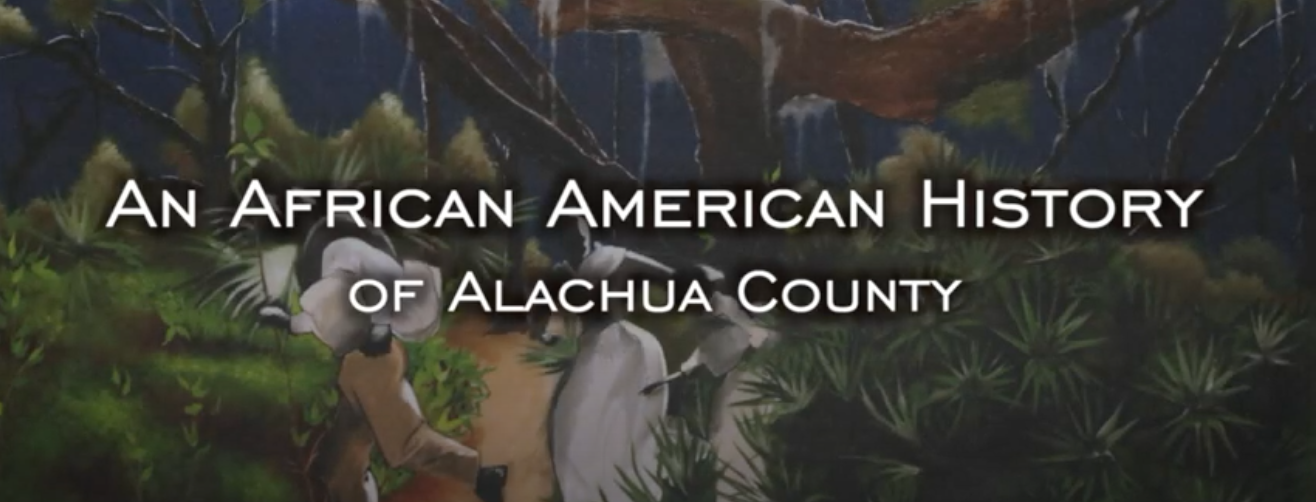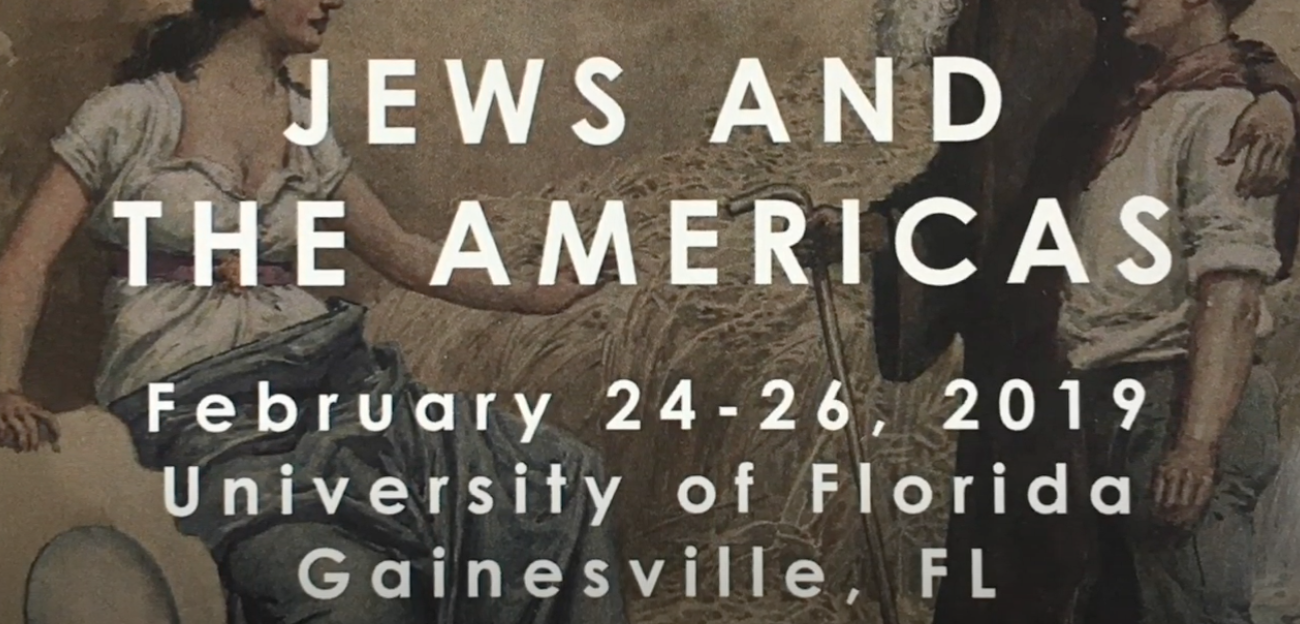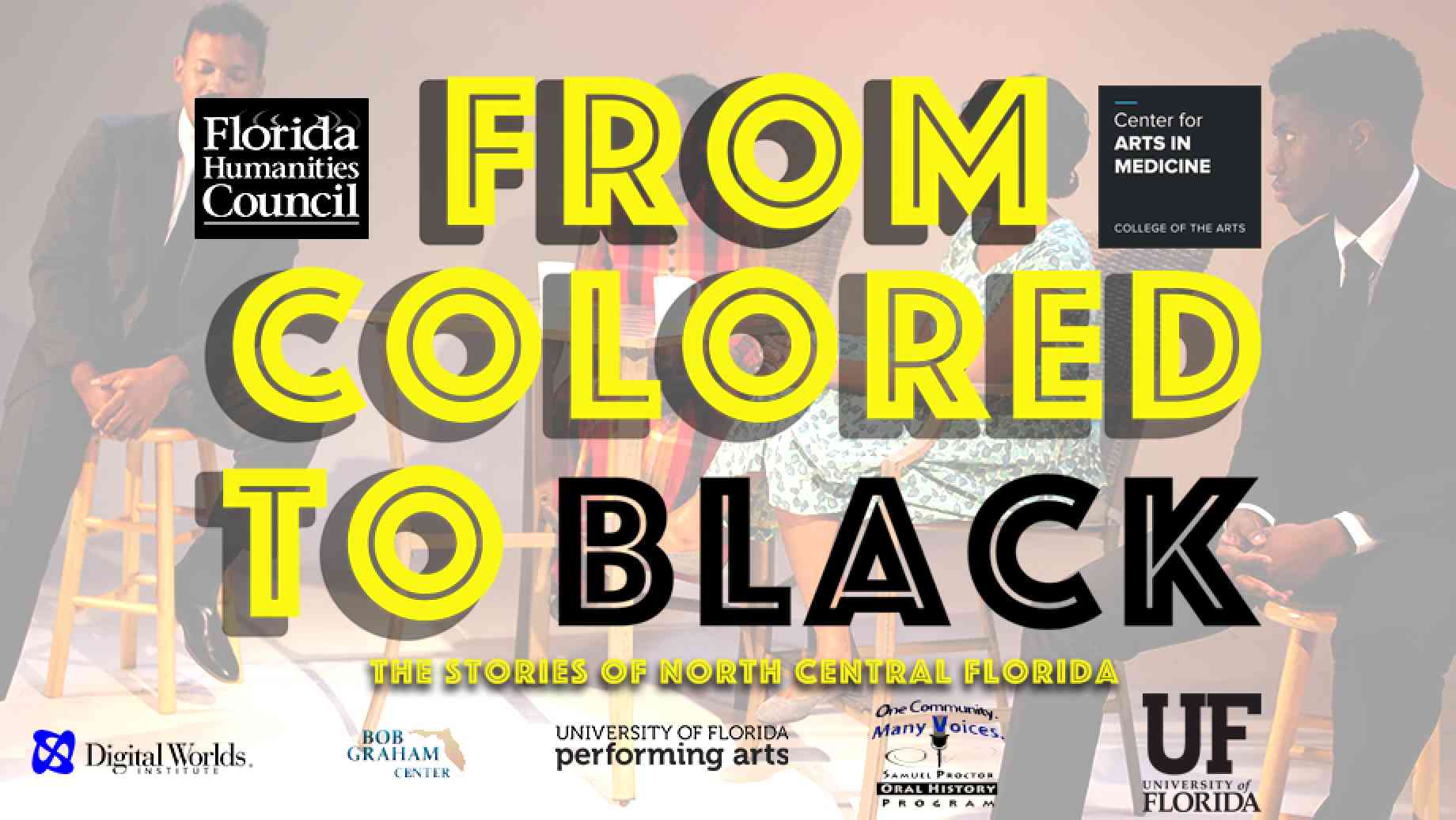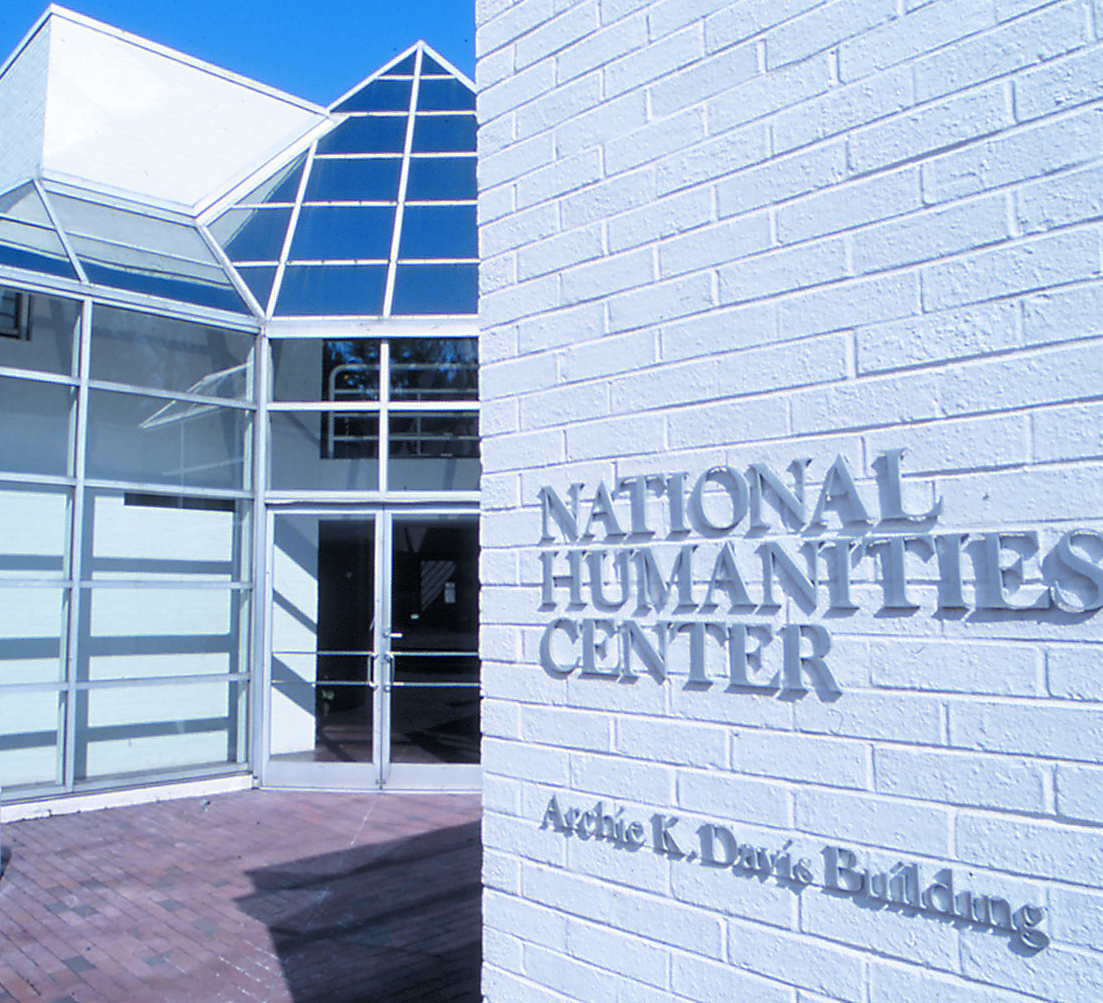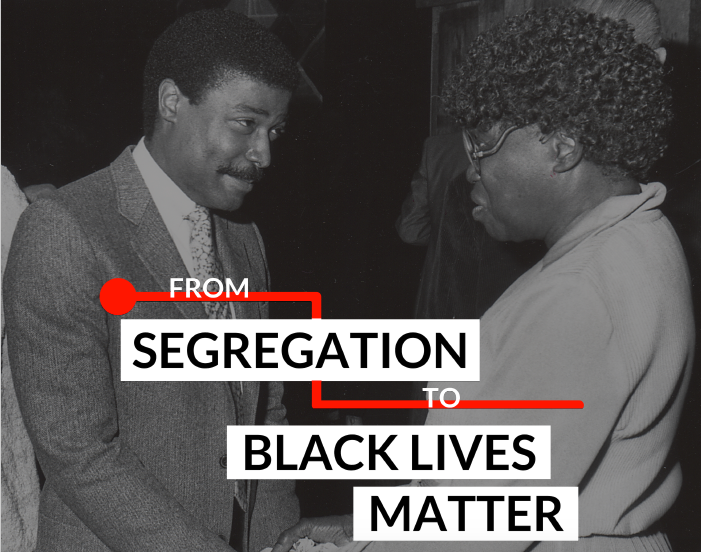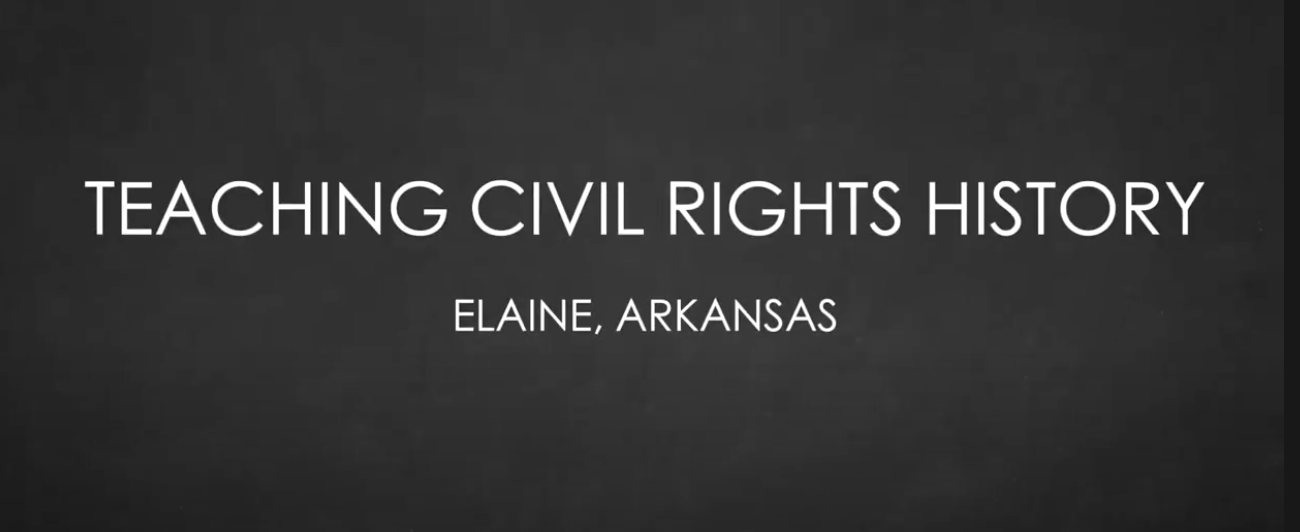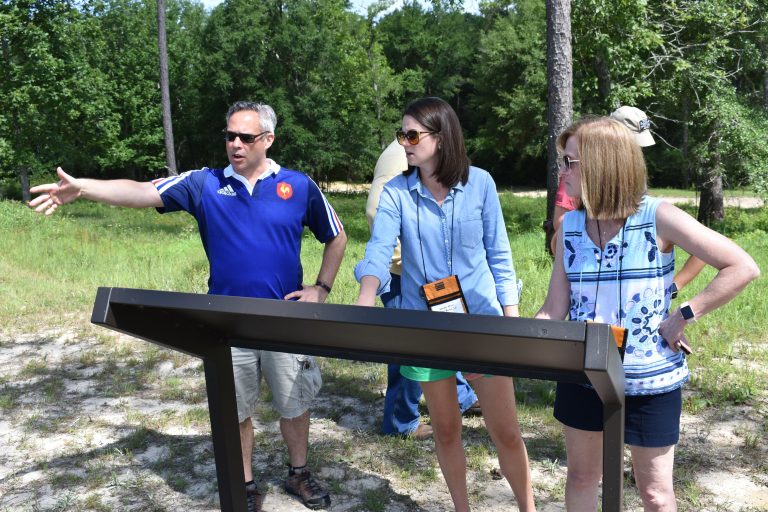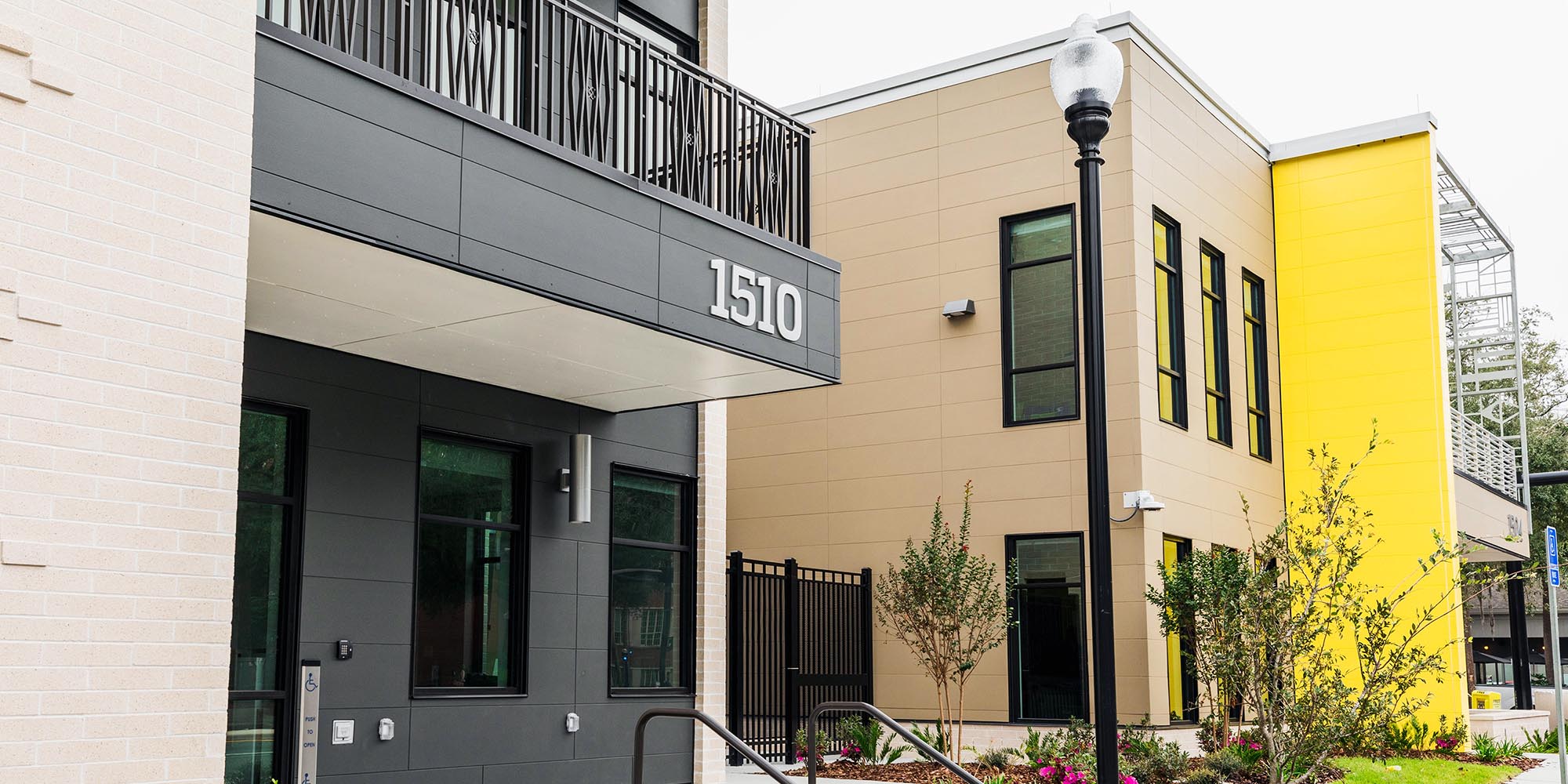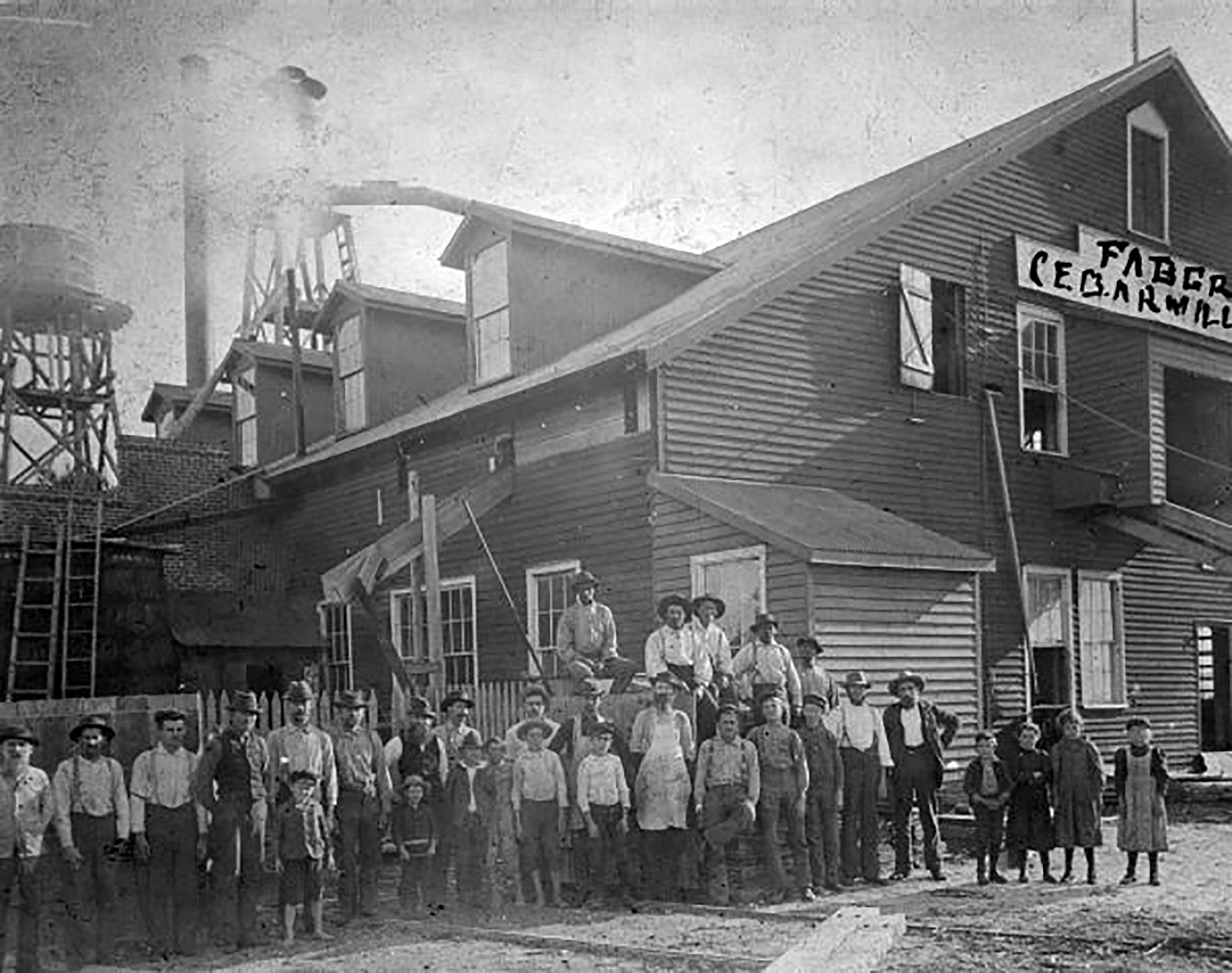2016
In Spring 2016, a Gainesville-wide speaker series will invite Florida residents from all backgrounds to share their stories about making Florida home.
Imagining Florida is a five-part series of lectures and discussions from January-April 2016. Talk writing with Gainesville author Lauren Groff at the ACLD Headquarters Branch Library. Unpeel the history of Florida citrus with Gary Mormino at the Matheson History Museum. Feast your eyes on African-Floridian art with Robin Poynor and Patricia Hilliard-Nunn at Santa Fe College. And dust off treasured artifacts from famous Floridians with curators from the UF Smathers Libraries.
2016
In Spring 2016, a Gainesville-wide speaker series will invite Florida residents from all backgrounds to share their stories about making Florida home.
Imagining Florida is a five-part series of lectures and discussions from January-April 2016. Talk writing with Gainesville author Lauren Groff at the ACLD Headquarters Branch Library. Unpeel the history of Florida citrus with Gary Mormino at the Matheson History Museum. Feast your eyes on African-Floridian art with Robin Poynor and Patricia Hilliard-Nunn at Santa Fe College. And dust off treasured artifacts from famous Floridians with curators from the UF Smathers Libraries.
2016
SPOHP 2009 public program featuring *Joel Buchanan* and including speakers Bernie Machen, Mrs. Evelyn Mickle, Zoharah Simmons, U.S. Senator Bill Nelson and others. This program launched SPOHP’s African American History Research Project funded by the Office of the Provost.
2016
SPOHP 2009 public program featuring *Joel Buchanan* and including speakers Bernie Machen, Mrs. Evelyn Mickle, Zoharah Simmons, U.S. Senator Bill Nelson and others. This program launched SPOHP’s African American History Research Project funded by the Office of the Provost.
2016
The Florida Queer History Project, founded in June 2016, is a growing archive of oral histories dedicated to highlighting the queer experience throughout the last century. The project aims to provide a means for queer-identified individuals to express and document how their sexual orientations and gender identities have shaped their lives. The Project also seeks to document the contemporary LGBTQ+ Movement through a variety of fieldwork initiatives—most recently by attending the 2017 Pride weekend in Washington, DC.
2016
The Florida Queer History Project, founded in June 2016, is a growing archive of oral histories dedicated to highlighting the queer experience throughout the last century. The project aims to provide a means for queer-identified individuals to express and document how their sexual orientations and gender identities have shaped their lives. The Project also seeks to document the contemporary LGBTQ+ Movement through a variety of fieldwork initiatives—most recently by attending the 2017 Pride weekend in Washington, DC.
2016
In July 2016, the Center for the Humanities and the Public Sphere sent a team of UF faculty (Jeff Pufahl, Arts in Medicine; Mike Spranger, UF IFAS Extension) and Reichert House Executive Director John Alexander Jr. to Performing Our Future, a workshop on arts and economic development in rural communities.
2016
In July 2016, the Center for the Humanities and the Public Sphere sent a team of UF faculty (Jeff Pufahl, Arts in Medicine; Mike Spranger, UF IFAS Extension) and Reichert House Executive Director John Alexander Jr. to Performing Our Future, a workshop on arts and economic development in rural communities.
2016
inFESTation: for punk is a pestilence that refuses cure. inFESTation: when your local scene explodes to become the capital of punk nation. inFESTation: when the subterranean hive is alive with the frenetic drives of alternative futures. inFESTation: when the sounds of the underground surround us with microphones, drones, and pedal tones. With distorted baritones and sonic tombstones. inFESTation is amped up, and it won't back down. inFESTation: an abrasive invasive that scrapes your ears and perforates your shoes. inFESTation: when hardcore carves out the caverns in your ribcage. inFESTation is a domination of black. inFESTation: when the academy that dissected and defined punk leaves the ivory tower and goes out into the street! inFESTation: when punk and postpunk expression invades the way we think, the way we write, and what we do.
2016
inFESTation: for punk is a pestilence that refuses cure. inFESTation: when your local scene explodes to become the capital of punk nation. inFESTation: when the subterranean hive is alive with the frenetic drives of alternative futures. inFESTation: when the sounds of the underground surround us with microphones, drones, and pedal tones. With distorted baritones and sonic tombstones. inFESTation is amped up, and it won't back down. inFESTation: an abrasive invasive that scrapes your ears and perforates your shoes. inFESTation: when hardcore carves out the caverns in your ribcage. inFESTation is a domination of black. inFESTation: when the academy that dissected and defined punk leaves the ivory tower and goes out into the street! inFESTation: when punk and postpunk expression invades the way we think, the way we write, and what we do.
2016
The symposium “Ethics and the Built Environment” aims to gain deeper understanding of the relationship between ethics and the built environment, especially within the rapid pace of cultural and technological production, agricultural challenges, and climate change in our contemporary world; to promote the consideration of ethics in the production of the built environment; to initiate and sustain a dialogue between the fields of arts, humanities, and sciences on this common ground, thus providing a more holistic understanding of the subject; and to encourage the influence of humanities discourses in the scientific fields.
2016
The symposium “Ethics and the Built Environment” aims to gain deeper understanding of the relationship between ethics and the built environment, especially within the rapid pace of cultural and technological production, agricultural challenges, and climate change in our contemporary world; to promote the consideration of ethics in the production of the built environment; to initiate and sustain a dialogue between the fields of arts, humanities, and sciences on this common ground, thus providing a more holistic understanding of the subject; and to encourage the influence of humanities discourses in the scientific fields.
2017
The Samuel Proctor Oral History Program in conjunction with Gainesville Community Redevelopment Agency hosted a free film screening of “Gator Tales,” the award-winning theatrical performance which highlights the experiences of the first generation of African American students at the University of Florida.
“Gator Tales” is an original play devised and directed by UF Arts Professor Kevin Marshall in conjunction with the Proctor Program at UF which premiered in 2015. This special film of the live theatre performance brings vividly to life the voices of those African Americans in Gainesville who struggled for civil rights and educational equality for all. Gator Tales was nominated for the 2015 Freedom Expression of Award by Amnesty International at the Edinburgh Festival in Scotland.
Special Guests and Performances:
The Flossie B. McLendon Memorial and Reichert House Drill Teams will perform color guard presentation.
Special guests will perform dance entitled “Young, Gifted and Black,” and sing the “Negro National Anthem”
An invocation by Prophet George Young III will be followed by opening remarks from Commissioner Golston
The character’s stories in “Gator Tales” are drawn from the oral history archive of the Samuel Proctor Oral History Program. Interviews with Joel Buchanan, Ron Coleman, Bernard Hicks, Thomas Holland Fay, Joseph McCloud, Maime Lee Leath, Evelyn Moore Mickle, Stephan Mickle, Leitha Nichols, David Padgett, Laura Scott Reaves, Samuel Taylor, Gladys Thompson and Albert White are featured in the production.
For more information please contact:
The Samuel Proctor Oral History Program, 352-392- 7168
Tamarra Jenkins, tamarraj@ufl.edu
Nigel Hamm with Gainesville Community Redevelopment Agency, (352) 393-8202 or HammN1@cityofgainesville.org
2017
The Samuel Proctor Oral History Program in conjunction with Gainesville Community Redevelopment Agency hosted a free film screening of “Gator Tales,” the award-winning theatrical performance which highlights the experiences of the first generation of African American students at the University of Florida.
“Gator Tales” is an original play devised and directed by UF Arts Professor Kevin Marshall in conjunction with the Proctor Program at UF which premiered in 2015. This special film of the live theatre performance brings vividly to life the voices of those African Americans in Gainesville who struggled for civil rights and educational equality for all. Gator Tales was nominated for the 2015 Freedom Expression of Award by Amnesty International at the Edinburgh Festival in Scotland.
Special Guests and Performances:
The Flossie B. McLendon Memorial and Reichert House Drill Teams will perform color guard presentation.
Special guests will perform dance entitled “Young, Gifted and Black,” and sing the “Negro National Anthem”
An invocation by Prophet George Young III will be followed by opening remarks from Commissioner Golston
The character’s stories in “Gator Tales” are drawn from the oral history archive of the Samuel Proctor Oral History Program. Interviews with Joel Buchanan, Ron Coleman, Bernard Hicks, Thomas Holland Fay, Joseph McCloud, Maime Lee Leath, Evelyn Moore Mickle, Stephan Mickle, Leitha Nichols, David Padgett, Laura Scott Reaves, Samuel Taylor, Gladys Thompson and Albert White are featured in the production.
For more information please contact:
The Samuel Proctor Oral History Program, 352-392- 7168
Tamarra Jenkins, tamarraj@ufl.edu
Nigel Hamm with Gainesville Community Redevelopment Agency, (352) 393-8202 or HammN1@cityofgainesville.org
2017
Beginning Thursday, March 16th, The Samuel Proctor Radio show hits the airwaves at 8:00 a.m with host Aliya Miranda.
Tune in daily for interesting stories on people, places and events. Click link at.
http://s2.yesstreaming.net:2199/start/wubafm/
This week's episode explores what a safe space means to different students and faculty at the University of Florida and what influences them to create those spaces on campus. We'll be examining what it took to put institutes such as IBC and La Casita in place as well as the significance of Ethnic Studies programs for students of all walks of life.
2017
Beginning Thursday, March 16th, The Samuel Proctor Radio show hits the airwaves at 8:00 a.m with host Aliya Miranda.
Tune in daily for interesting stories on people, places and events. Click link at.
http://s2.yesstreaming.net:2199/start/wubafm/
This week's episode explores what a safe space means to different students and faculty at the University of Florida and what influences them to create those spaces on campus. We'll be examining what it took to put institutes such as IBC and La Casita in place as well as the significance of Ethnic Studies programs for students of all walks of life.
2017
Dr. Julian Chambliss and Curtis Michelson talk about their part in the amazing journey to discover a secret hidden since 1922. Lake Jenny Jewel near Orlando, Florida, was the site of a lynching amid the violence of the early part of the 20th century against African American citizens. Only in this case the victim escaped, and so birthed the events of the next 90 years, all from said victim, by the name of Oscar Mack.
Produced by the Samuel Proctor Oral History Program
2017
Dr. Julian Chambliss and Curtis Michelson talk about their part in the amazing journey to discover a secret hidden since 1922. Lake Jenny Jewel near Orlando, Florida, was the site of a lynching amid the violence of the early part of the 20th century against African American citizens. Only in this case the victim escaped, and so birthed the events of the next 90 years, all from said victim, by the name of Oscar Mack.
Produced by the Samuel Proctor Oral History Program
2017
Professor of Religion at UF, Dr. Gwendolyn Zoharah Simmons is a UF professor of religion who participated in Freedom Summer in Mississippi in 1964. A former leader of the Student Nonviolent Coordinating Committee (SNCC) in Laurel, Mississippi and Atlanta, Georgia, Simmons instituted a sexual harassment policy to protect the female volunteers of the project. Because of her reputation as an “Amazon,” who, “didn’t take any s***, especially off of men,” the Laurel Project was referred to as the “Amazon Project.” Dr. Simmons, a Sufi Muslim, draws on the compassion and inclusiveness of her faith in her work as a community organizer, scholar and writer. In 2016, at the invitation of the Fellowship of Reconciliation, she lectured in four European countries about the history and meaning of the African American freedom movement.
This vignette features clips from an interview with Dr. Simmons in which she details the beginning of the Laurel Project.
2017
Professor of Religion at UF, Dr. Gwendolyn Zoharah Simmons is a UF professor of religion who participated in Freedom Summer in Mississippi in 1964. A former leader of the Student Nonviolent Coordinating Committee (SNCC) in Laurel, Mississippi and Atlanta, Georgia, Simmons instituted a sexual harassment policy to protect the female volunteers of the project. Because of her reputation as an “Amazon,” who, “didn’t take any s***, especially off of men,” the Laurel Project was referred to as the “Amazon Project.” Dr. Simmons, a Sufi Muslim, draws on the compassion and inclusiveness of her faith in her work as a community organizer, scholar and writer. In 2016, at the invitation of the Fellowship of Reconciliation, she lectured in four European countries about the history and meaning of the African American freedom movement.
This vignette features clips from an interview with Dr. Simmons in which she details the beginning of the Laurel Project.
2018
Beginning in 2018, the Center for the Humanities and the Public Sphere, with the support of the Robert and Margaret Rothman Endowment for the Humanities and the College of Liberal Arts and Sciences, has supported UF faculty participation in summer programs at the National Humanities Center (NHC) in Research Triangle Park, North Carolina. These include: a one-month faculty residency at the NHC, and participation in virtual themed institutes that focus on practical teaching, research, and professionalization skills.
2018
Beginning in 2018, the Center for the Humanities and the Public Sphere, with the support of the Robert and Margaret Rothman Endowment for the Humanities and the College of Liberal Arts and Sciences, has supported UF faculty participation in summer programs at the National Humanities Center (NHC) in Research Triangle Park, North Carolina. These include: a one-month faculty residency at the NHC, and participation in virtual themed institutes that focus on practical teaching, research, and professionalization skills.
2018
SPOHP panel moderated by Paul Ortiz. Featuring UF Alumni and current students discussing the intersections of Black and Latinx Histories at UF from the 1960s to present.
Join us for a discussion on the histories of the Institute of Black Culture and the Institute of Hispanic-Latino Culture (aka “La Casita”), including their founding and their entwined legacies. Not a formal panel discussion, this is intended to be an open dialogue between these speakers and the UF community.
Panelists include Dr. David Horne (Cal State Northridge), one of the organizers of the Black Thursday protest that led to the founding of the IBC. Dr. Horne is accompanied by Dr. Maria Masque, former director of La Casita.
Also speaking are UF Students Daniel Clayton and Christopher Garcia.
Introduced by graduate research assistant Juliette Barbera, Juanita Duque, and moderated by Dr. Paul Ortiz
2018
SPOHP panel moderated by Paul Ortiz. Featuring UF Alumni and current students discussing the intersections of Black and Latinx Histories at UF from the 1960s to present.
Join us for a discussion on the histories of the Institute of Black Culture and the Institute of Hispanic-Latino Culture (aka “La Casita”), including their founding and their entwined legacies. Not a formal panel discussion, this is intended to be an open dialogue between these speakers and the UF community.
Panelists include Dr. David Horne (Cal State Northridge), one of the organizers of the Black Thursday protest that led to the founding of the IBC. Dr. Horne is accompanied by Dr. Maria Masque, former director of La Casita.
Also speaking are UF Students Daniel Clayton and Christopher Garcia.
Introduced by graduate research assistant Juliette Barbera, Juanita Duque, and moderated by Dr. Paul Ortiz
2018
The Scholars in Peru (IDH3931) study abroad course in Cusco, Peru focuses on community engagement and the preservation of cultural heritage. In partnership with the Archbishopric of Cusco and Peru's Ministry of Culture students help restore endangered adobe churches from the colonial era. The course also includes critical discussions of “voluntourism,” a weaving workshop, and on-site engagement with art and architecture. The course takes place in early May every two years, and is taught by Professors Regan Garner and Maya Stanfield-Mazzi.
2018
The Scholars in Peru (IDH3931) study abroad course in Cusco, Peru focuses on community engagement and the preservation of cultural heritage. In partnership with the Archbishopric of Cusco and Peru's Ministry of Culture students help restore endangered adobe churches from the colonial era. The course also includes critical discussions of “voluntourism,” a weaving workshop, and on-site engagement with art and architecture. The course takes place in early May every two years, and is taught by Professors Regan Garner and Maya Stanfield-Mazzi.
2018
Assembly for Action is committed to educating and enabling the next generation of leaders at the University of Florida to bridge the gap between student involvement and non - profit needs in Gainesville. This innovative program is the result of a collaborative effort with various student organizations, colleges, and institutions at the University of Florida and across Gainesville culminating in a four day conference. In addition to special lectures in leadership, social entrepreneurship, public speaking, and many other topics, Action Scholars will be paired with a local non - profit that best matches their preferences and work with that non - profit in an organized day of service. After learning about how non - profit function and the challenges they face, students will be tasked with synthesizing the information from the special lectures and experience to help write a proposal. The proposals will be considered by an independent panel of judges with the top students being asked to present. The winning group will receive a $2000 grant in seed money to be used in turning their community project into a reality. For more information, go to https://assemblyforaction.org/
2018
Assembly for Action is committed to educating and enabling the next generation of leaders at the University of Florida to bridge the gap between student involvement and non - profit needs in Gainesville. This innovative program is the result of a collaborative effort with various student organizations, colleges, and institutions at the University of Florida and across Gainesville culminating in a four day conference. In addition to special lectures in leadership, social entrepreneurship, public speaking, and many other topics, Action Scholars will be paired with a local non - profit that best matches their preferences and work with that non - profit in an organized day of service. After learning about how non - profit function and the challenges they face, students will be tasked with synthesizing the information from the special lectures and experience to help write a proposal. The proposals will be considered by an independent panel of judges with the top students being asked to present. The winning group will receive a $2000 grant in seed money to be used in turning their community project into a reality. For more information, go to https://assemblyforaction.org/
2018
In 2018, The Center for the Humanities and the Public Sphere, with the support of the Robert and Margaret Rothman Endowment for the Humanities, offered an inaugural funding opportunity for reading groups in the humanities. Groups use this as an opportunity for scholarly exchange on a shared topic of interest related to the humanities. Their long-term goals may include exploring the possibilities of a shared research agenda, deepening interdisciplinary knowledge, learning from one another, organizing a symposium, and developing future grant proposals. This program allows participants from across the campus and beyond to explore complex issues at a moment when cross-disciplinary collaboration is crucial to address shifting domains of knowledge and a rapidly changing world.
2018
In 2018, The Center for the Humanities and the Public Sphere, with the support of the Robert and Margaret Rothman Endowment for the Humanities, offered an inaugural funding opportunity for reading groups in the humanities. Groups use this as an opportunity for scholarly exchange on a shared topic of interest related to the humanities. Their long-term goals may include exploring the possibilities of a shared research agenda, deepening interdisciplinary knowledge, learning from one another, organizing a symposium, and developing future grant proposals. This program allows participants from across the campus and beyond to explore complex issues at a moment when cross-disciplinary collaboration is crucial to address shifting domains of knowledge and a rapidly changing world.
2019
Alachua County’s African American ancestry contributed significantly to the area’s history. Once enslaved pioneers Richard and Juliann Sams settled in Archer as early as 1839. They were former slaves of James M. Parchman, who journeyed through the wilderness from Parchman, Mississippi. They and others shaped the county’s history through inventions, education, and a work ethic based on spirituality. Lizzie Jenkin’s book, Alachua County, Florida (Black America Series), shows people working together from the early 1800s rural farm life, when racial violence was routine, until African Americans broke the chains of injustice and started organizing and controlling civic affairs.
2019
Alachua County’s African American ancestry contributed significantly to the area’s history. Once enslaved pioneers Richard and Juliann Sams settled in Archer as early as 1839. They were former slaves of James M. Parchman, who journeyed through the wilderness from Parchman, Mississippi. They and others shaped the county’s history through inventions, education, and a work ethic based on spirituality. Lizzie Jenkin’s book, Alachua County, Florida (Black America Series), shows people working together from the early 1800s rural farm life, when racial violence was routine, until African Americans broke the chains of injustice and started organizing and controlling civic affairs.
2019
The role of El Salvadorans and others in providing sanctuary to Jewish refugees from Germany in the years leading up to World War II.
Produced by the Samuel Proctor Oral History Program
2019
The role of El Salvadorans and others in providing sanctuary to Jewish refugees from Germany in the years leading up to World War II.
Produced by the Samuel Proctor Oral History Program
2019
From Colored to Black explores the intersections between public health education, oral history performance, and community arts activism, and functions as a multi-modal platform to communicate health data, historical research, and the lived experience of the Black community to the public.
Created by emerging African American playwright and UF graduate Ms. Brittney M. Caldwell, and Jeffrey Pufahl, Lecturer in the Center for Arts in Medicine, this groundbreaking play incorporates dramatized Civil Rights era oral histories excavated from the UF archive into an analytical framework designed to educate audiences and provoke critical dialogue.
The play exposes the origins and mechanisms of systemic racism on the Black community and traces these mechanisms through history, revealing their impact on current health and social issues. Themes include:
women’s roles in the Civil Rights Movement
the St. Augustine Civil Rights Movement
epigenetics and intergenerational stress and trauma
the significance of redlining and racist public policies on education and community health
the lasting effects of integration on Black education
Black identity and the portrayal of Blackness in the media
2019
From Colored to Black explores the intersections between public health education, oral history performance, and community arts activism, and functions as a multi-modal platform to communicate health data, historical research, and the lived experience of the Black community to the public.
Created by emerging African American playwright and UF graduate Ms. Brittney M. Caldwell, and Jeffrey Pufahl, Lecturer in the Center for Arts in Medicine, this groundbreaking play incorporates dramatized Civil Rights era oral histories excavated from the UF archive into an analytical framework designed to educate audiences and provoke critical dialogue.
The play exposes the origins and mechanisms of systemic racism on the Black community and traces these mechanisms through history, revealing their impact on current health and social issues. Themes include:
women’s roles in the Civil Rights Movement
the St. Augustine Civil Rights Movement
epigenetics and intergenerational stress and trauma
the significance of redlining and racist public policies on education and community health
the lasting effects of integration on Black education
Black identity and the portrayal of Blackness in the media
2019
Beginning in 2019, The Center for the Humanities and the Public Sphere — with the support of the Director Barbara Mennel’s Waldo W. Neikirk Professorship — supports Ph.D. students in UF’s College of Liberal Arts and Sciences for intensive one-week themed residencies and institutes at the National Humanities Center that focus on practical teaching, research, and professionalization skills.
2019
Beginning in 2019, The Center for the Humanities and the Public Sphere — with the support of the Director Barbara Mennel’s Waldo W. Neikirk Professorship — supports Ph.D. students in UF’s College of Liberal Arts and Sciences for intensive one-week themed residencies and institutes at the National Humanities Center that focus on practical teaching, research, and professionalization skills.
2019
Celebrating the Opening of the Joel Buchanan Archive of African American History at UF: A 3 Day Symposium.
2019
Celebrating the Opening of the Joel Buchanan Archive of African American History at UF: A 3 Day Symposium.
2019
The Joel Buchanan Archive of African American Oral History contains over 700 oral history interviews with African American elders throughout Florida and the wider Gulf South. These interviews and the overall projects associated with them have resulted in numerous public programs, university seminars on African American history and Ethnic Studies, and community-based oral history workshops. The archive contains interviews from numerous different projects at the Samuel Proctor Oral History Program, including the African American History Project (AAHP) which began in 2009 through the efforts of Paul Ortiz, Marna Weston, and Joel Buchanan; the Fifth Avenue Blacks collection (FAB) created by Joel Buchanan in 1981; the Mississippi Freedom Project (MFP) which derives from SPOHP’s annual trip to the Mississippi Delta to interview Civil Rights Movement veterans; the Oscar Mack Project (OMP), detailing the remarkable story and legacy of Oscar Mack and his family; the Underground Railroad collection (URR) which includes interviews with Black Seminoles and Gullah-Geechee elders and leaders; the Civil Rights in St. Augustine collection begun by David Colburn in the late 1970s; the St. Augustine African American History collection (SAAH), begun by Raja Rahim and Annemarie Nichols in 2016; and many more. Click on the project logos below to learn more.
2019
The Joel Buchanan Archive of African American Oral History contains over 700 oral history interviews with African American elders throughout Florida and the wider Gulf South. These interviews and the overall projects associated with them have resulted in numerous public programs, university seminars on African American history and Ethnic Studies, and community-based oral history workshops. The archive contains interviews from numerous different projects at the Samuel Proctor Oral History Program, including the African American History Project (AAHP) which began in 2009 through the efforts of Paul Ortiz, Marna Weston, and Joel Buchanan; the Fifth Avenue Blacks collection (FAB) created by Joel Buchanan in 1981; the Mississippi Freedom Project (MFP) which derives from SPOHP’s annual trip to the Mississippi Delta to interview Civil Rights Movement veterans; the Oscar Mack Project (OMP), detailing the remarkable story and legacy of Oscar Mack and his family; the Underground Railroad collection (URR) which includes interviews with Black Seminoles and Gullah-Geechee elders and leaders; the Civil Rights in St. Augustine collection begun by David Colburn in the late 1970s; the St. Augustine African American History collection (SAAH), begun by Raja Rahim and Annemarie Nichols in 2016; and many more. Click on the project logos below to learn more.
2019
A workshop presented in Elaine, Arkansas at the Elaine Legacy Center by the Samuel Proctor Oral History Program. Each year the program makes an annual trip to the Mississippi Delta and surrounds to collect Civil Rights interviews.
SPOHP Presenters are Chris Duryea and Paul Ortiz. During this workshop there is a group discussion on Reparations.
2019
A workshop presented in Elaine, Arkansas at the Elaine Legacy Center by the Samuel Proctor Oral History Program. Each year the program makes an annual trip to the Mississippi Delta and surrounds to collect Civil Rights interviews.
SPOHP Presenters are Chris Duryea and Paul Ortiz. During this workshop there is a group discussion on Reparations.
2020
Working as a historian keeps Dr. Sean Adams in climate-controlled atmospheres — air-conditioned classrooms, comfortable offices, academic panels in staid hotel conference rooms and carefully maintained archives. In the summer of 2018, however, Dr. Adams purposely ventured out into the blast furnace that is western Florida and southern Alabama to see history firsthand, taking 36 teachers of elementary, middle and high school with him, plus a colleague.
The reason for this venture was a joint workshop by the Florida Humanities Council and the Alabama Humanities Foundation titled “The Civil War in the American South.” For the past five years, Dr. Adams has led teacher workshops that combine lectures and field trips to the site of the 1864 Battle of Olustee at Fort Clinch and the haunting slave cabins at Kingsley Plantation in Fernandina Beach.
The idea is to put teachers in the places where history happened so they can bring that experience back to their classrooms, where students might gain a new perspective on the past.
2020
Working as a historian keeps Dr. Sean Adams in climate-controlled atmospheres — air-conditioned classrooms, comfortable offices, academic panels in staid hotel conference rooms and carefully maintained archives. In the summer of 2018, however, Dr. Adams purposely ventured out into the blast furnace that is western Florida and southern Alabama to see history firsthand, taking 36 teachers of elementary, middle and high school with him, plus a colleague.
The reason for this venture was a joint workshop by the Florida Humanities Council and the Alabama Humanities Foundation titled “The Civil War in the American South.” For the past five years, Dr. Adams has led teacher workshops that combine lectures and field trips to the site of the 1864 Battle of Olustee at Fort Clinch and the haunting slave cabins at Kingsley Plantation in Fernandina Beach.
The idea is to put teachers in the places where history happened so they can bring that experience back to their classrooms, where students might gain a new perspective on the past.
2020
Student-produced documentary featuring UF alumni, students, faculty and staff discussing the origins and importance of the Institute of Black Culture at UF. Funded by the Office of the Provost.
The Making of IBC is a documentary film produced by the Samuel Proctor Oral History Program and funded by the UF Office of the Provost. This film draws on oral history interviews conducted by students, staff and volunteers at the Proctor Program to chronicling the history of the Institute of Black Culture, Black students and faculty at the University of Florida.
The Making of IBC examines the student movements that led to the creation and preservation of the Institute of Black Culture. This film draws on oral history interviews conducted by students, staff and volunteers at the Proctor Program.
Juliette Barbera, who initially proposed that we develop this documentary, led the student teams in all aspects from interviewing efforts to the direction of the film itself.
These accounts demonstrate that the fight to maintain the historical integrity of these cultural spaces is inextricably linked to the struggle for ethnic studies and cultural programing throughout campus. Exploring the recurring waves of student activism surrounding this cultural center reveals that this struggle is ongoing and that it will be up to future generations of students to reclaim spaces such as the Institute of Black Culture as their own.
2020
Student-produced documentary featuring UF alumni, students, faculty and staff discussing the origins and importance of the Institute of Black Culture at UF. Funded by the Office of the Provost.
The Making of IBC is a documentary film produced by the Samuel Proctor Oral History Program and funded by the UF Office of the Provost. This film draws on oral history interviews conducted by students, staff and volunteers at the Proctor Program to chronicling the history of the Institute of Black Culture, Black students and faculty at the University of Florida.
The Making of IBC examines the student movements that led to the creation and preservation of the Institute of Black Culture. This film draws on oral history interviews conducted by students, staff and volunteers at the Proctor Program.
Juliette Barbera, who initially proposed that we develop this documentary, led the student teams in all aspects from interviewing efforts to the direction of the film itself.
These accounts demonstrate that the fight to maintain the historical integrity of these cultural spaces is inextricably linked to the struggle for ethnic studies and cultural programing throughout campus. Exploring the recurring waves of student activism surrounding this cultural center reveals that this struggle is ongoing and that it will be up to future generations of students to reclaim spaces such as the Institute of Black Culture as their own.
2020
An ongoing project of the Laboratory of Southeastern Archaeology, Storms of the Past, Stories for the Future investigates the relationship between memories of past storms and perceptions of storms yet to come. Although the ultimate objective of this project is to provide policy-relevant information for planning purposes, its method is not to forecast the future but rather to document the “futures past” of historic storms. How do memories of past storms inflect the histories of post-storm recovery and rebuilding? The project started with the 1896 hurricane that impacted the cedar mill industry of Atsena Otie on Florida's northern Gulf Coast and continues with a Gulf-wide survey of other victims of devastating storms.
2020
An ongoing project of the Laboratory of Southeastern Archaeology, Storms of the Past, Stories for the Future investigates the relationship between memories of past storms and perceptions of storms yet to come. Although the ultimate objective of this project is to provide policy-relevant information for planning purposes, its method is not to forecast the future but rather to document the “futures past” of historic storms. How do memories of past storms inflect the histories of post-storm recovery and rebuilding? The project started with the 1896 hurricane that impacted the cedar mill industry of Atsena Otie on Florida's northern Gulf Coast and continues with a Gulf-wide survey of other victims of devastating storms.
